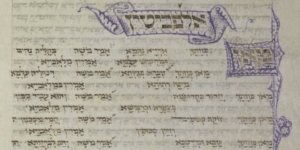Since the use of targum became a special rare occasion, Jews did what we do for special rare occasions — we write piyyutim. An extensive series of Aramaic piyyutim were written, to be inserted into the recitation of the targum (or the ‘seder meturgeman’) itself. On Shavuot, a massive series of piyyutim, one for every one of the ten commandments and then some, were written. On Pesaḥ, a similar number of piyyutim were composed for important moments.
Since the mass acceptance of the Shulḥan Arukh, the custom of the recitation of the targum on these special days has been lost from Ashkenazi practice, and as a consequence the vast majority of the seder meturgeman piyyutim themselves have been abandoned. A small number of Shavuot seder meturgeman piyyutim are still in use (specifically, Aḳdamut Milin and Yetsiv Pitgam), but taken out of their original context. (As an example, why do we read Yetsiv Pitgam after the first verse of the haftarah? Because it’s meant to introduce the targum!)
I personally love Aramaic, piyyutim, and liturgy, so I’ve taken it upon myself to translate a selection of seder meturgeman piyyutim. This piyyut, Man K’vatakh (Who is Like You), the seventh in a series of Aramaic piyyutim from the seventh day of Pesaḥ, is meant to be recited as an introduction to the Targum of the verse that includes “Mi Khamokha.” The English translation preserves the Hebrew acrostic of the Aramaic.
| Source (Armaic) | Source (English) |
|---|---|
מַן־כְּוָתָךְ אַרְיָה נַהֲמָאאֲמַר מֹשֶׁה׃ בְּקַלֵיהּ נָהֵים וּמַרְעִישׁ עַלְמָאאָמְרִין מַלְאָכַיָּא׃ |
Who is like You, A roaring lion? — says Moses. Blustering with voice through the world entire! — say the angels. |
מַן־כְּוָתָךְ גִּיבוֹר בְּגֵיוְתָאאֲמַר מֹשֶׁה׃ דְּכוּלֵיהּ עַלְמָא מִנָּךְ מְתַתְּתָּאאָמְרִין מַלְאָכַיָּא׃ |
Who is like You, Great mighty One? — says Moses. Dread makes all the world tremble! — say the angels. |
מַן־כְּוָתָךְ הֲדוֹר בְּקֻדְשָׁא אֲמַר מֹשֶׁה׃ וַעֲבַד נִיסִן בְּצַפְרָא וּבְרַמְשָׁא אָמְרִין מַלְאָכַיָּא׃ |
Who is like You, Elegant in holiness? — says Moses. Working miracles day and night! — say the angels. |
מַן־כְּוָתָךְ זוֹקֵף כְּפוּפִיםאֲמַר מֹשֶׁה׃ חָמֵי מִסְכֵּינִים וְזָיֵין סְכִיפִין אָמְרִין מַלְאָכַיָּא׃ |
Who is like You, Zigzagged-back helper? — says Moses. Helping the derelict and needy! — say the angels. |
מַן־כְּוָתָךְ טָבָא וּמֵיטִיבָא אֲמַר מֹשֶׁה׃ יְהַב לִבְרִיָתָא אוֹצָרֵיהּ טָבָא אָמְרִין מַלְאָכַיָּא׃ |
Who is like You, THe good One, who does good? — says Moses. You give creation Your treasury of good! — say the angels. |
מַן־כְּוָתָךְ כּוֹבֵשׁ חוֹבִיןאֲמַר מֹשֶׁה׃ לִֹידֵהּ מְקָרֵב טוּבָן דְּתַיְבִין אָמְרִין מַלְאָכַיָּא׃ |
Who is like You, Conquering punishment? — says Moses. Later recalling the goodness of the repentant! — say the angels. |
מַן־כְּוָתָךְ מֶלֶךְ מַלְכַיָּאאֲמַר מֹשֶׁה׃ נְסַב אַרְכַּיּיָא מִן־כׇּל־אִיפַּרְכַיָּא אָמְרִין מַלְאָכַיָּא׃ |
Who is like You, Monarch of monarchs? — says Moses. Negating autarchy from all eparchs! — say the angels. |
מַן־כְּוָתָךְ סוֹמֵךְ נוֹפְלִיםאֲמַר מֹשֶׁה׃ עוֹנֶה עֲלוּבִים דהוו מוּשְׁפָּלִים אָמְרִין מַלְאָכַיָּא׃ |
Who is like You, Supporiting the fallen? — says Moses. Of the sorrowful ones laid low You answer! — say the angels. |
מַן־כְּוָתָךְ פּוֹדֶה וְחוֹבֵשׁאֲמַר מֹשֶׁה׃ צְדָקָה לוֹבֵשׁ נְקָמָה מִתְלָבֵּשׁ אָמְרִין מַלְאָכַיָּא׃ |
Who is like You, PErforming redemption and healing? — says Moses. CHarity clothed, but vengeance dressed! — say the angels. |
מַן־כְּוָתָךְ קָרֵב לְעַבְדָּךְ אֲמַר מֹשֶׁה׃ רַבְרְבִין עוּבְדָּךְ וְכוֹלָּא עוֹבָדֵי יְדָךְאָמְרִין מַלְאָכַיָּא׃ |
Who is like You, Quite close to Your servants? — says Moses. Renowned Your deeds and Your handiwork! — say the angels. |
מַן־כְּוָתָךְ שָׁלִיט בְּאֶכְּסוּסְיָאאֲמַר מֹשֶׁה׃ יָהּ עָבֵיד נִיסַיָּא עֲמֻסַיָּא אָמְרִין מַלְאָכַיָּא |
Who is like You, Surely ruling in authority, — says Moses. Yah, doing miracles for those borne! — say the angels. |
מַן־כְּוָתָךְ תַּקִּיף בְּאֶרְאֶלִּים אֲמַר מֹשֶׁה לִשְׁמָךְ מְהַלְלִים — מִֽי־כָמֹ֤כָה בָּֽאֵלִם֙ אָמְרִין מַלְאָכַיָּא׃ |
Who is like You, Truly Mighty, among the Erelim? — says Moses. Praise Your name! Who is like You among the deities? — say the angels. |

“מַן־כְּוָתָךְ | Man K’vatakh (Who is Like You) — a piyyut for the Seder Meturgeman of the 7th Day of Pesaḥ” is shared through the Open Siddur Project with a Creative Commons Attribution-ShareAlike 4.0 International copyleft license.










Leave a Reply